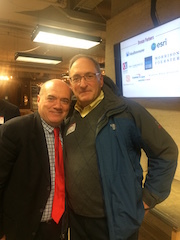Lessons from following your passion in business and finding your specialization in a crowded market
Executive, Venture Capitalist, & Entrepreneur Gary Voight shares lessons from his 40 years in business.
Many will tell you that the best way into business is to start off in sales. In fact, starting in sales forces you to adopt many of the skills you need to succeed as an entrepreneur, not to mention the independence and self-starting any career in sales requires.
Gary Voight can attest to this advice: he started off in sales and benefited from the serendipitous timing of the early days in the computer business. From there, he formed a pattern: join early stage companies, work hard to win customers from more established competitors, and learn to value the stock option. Throughout that path, he remained passionate about trying out and being involved in new things, which led him to several startups, through rounds of raising capital and turning around failing companies.
As an investor, Gary's track record stands out: from his ten investments, four were strong exits. In many cases, an investment is as good as the CEO running the show but Gary has noticed something more central to how these businesses succeed: the niche within which they operate. Finding your specialization or your niche is a critical step in creating a product or service to market. Without the niche, there is no enterprise and certainly no hope for entrepreneurial success--after all, you don't want to reinvent the wheel.
The ability to find your niche is tantamount to succeeding in a market or business that can often feel overcrowded: take, for example, real estate. It can also allow you to pivot something that already exists into a service the market is aching for: like marketing support for an up-and-coming industry. And, the right niche can allow you to launch a product that is so new and unusual, it is hard to know what appetite might exist.
Today Gary wears a couple of hats: mentor to CEOs, angel investor, strategic advisor, and entrepreneur. He shares how he got there, what he has learned, and a few tips for successfully starting your business.
Steve Mariotti: When did you first think of yourself as an entrepreneur?
Gary Voight: I was born into a family of entrepreneurs, although we didn't call ourselves by that name. As first generation immigrants my parents didn't have many choices for work. Starting and running a business was the natural thing to do.
When I was young, I worked landscaping in the summer, and shoveling snow in the winter. I even got up early to start cars for my neighbors so they could get into a warm and cleaned off vehicle. When I was 14 I started working with my uncle renting televisions to patients at Hurley Hospital in Flint. That was my first experience receiving a regular paycheck.
When I was in business school at the University of Michigan, the holy grail was to hold a corporate executive position at a large company--this was before business schools started offering entrepreneurship. I was going down that path working in sales and operations until I was CEO for a reasonably large software company. Around age 50, I decided that I really wanted to become an entrepreneur and started a company called Archivas; and I started investing in new companies.
SM: What was your biggest failure and what did you learn from it?
GV: I have invested in a bar in the Los Angeles area and lost money. I have invested in a business that does MRIs for dogs and cats and lost my complete investment. I have a few investments in software companies that I don't think will ever pay off. Even my successes had their moments when they could have failed, but something came up to make them succeed.
What have I learned from these failures? First, don't give up. Sometimes just surviving the lows gives a business the opportunity to get traction. This often happens outside the original plan. Second, I like to invest in businesses where they operate in a well-defined market niche. This makes it easier for them to get into the market and reach their customers. When you don't have this capability you have to spend a lot of money in marketing, something most businesses just can't afford to do.
When I'm looking at businesses the one thing I see from new (young and old) entrepreneurs is that they underestimate the capital required. This usually leads to trouble, and mostly to failure.
SM: What was your greatest success and what do you think made it possible?
GV: My greatest success was developing a niche for myself--in middleware within the software industry. Many people don't understand middleware software because it's in the infrastructure and it's geeky but it brought the internet and e-commerce to businesses and consumers. I participated in many very high profile customers and implementations that you are using today. That middleware reputation gave me the opportunity for several other big career moves, and taught me about the software business. I started working with middleware software at a company called ISIS Distributed Systems (they would not pick that name today!) in 1993. We were ahead of everyone, but the company that owned us didn't realize the potential. Then I went to Transarc Corporation. Their product, Encina, was the basis for WebSphere and became a very big brand and money-maker for IBM. When IBM was running "IBM is eBusiness" commercials, it was WebSphere and related middleware products, along with services, that enabled IBM to become the leader in eBusiness and ecommerce.
SM: What are the biggest challenges someone starting a business faces today?
GV: Raising capital....and knowing how much to raise are the most pressing challenges. Staying focused and selecting the right people to help is next. A bad employee is like cancer--they have to be cut out very early. Many new entrepreneurs hang on too long to a poor performing employees or just the wrong person.
Gary's Four Essential Tips to Starting Up1. Figure out why your product is important to someone and create a strong value proposition.
2. Test that value proposition with others. Be careful not to BS yourself. When your value proposition is not right, investors will not invest.
3. Figure out how to get your product or service to market, and estimate the cost. Now triple that.
4. Make sure you really know why you want to start or run a business. I'm still surprised at the answers I receive when I ask that question.



